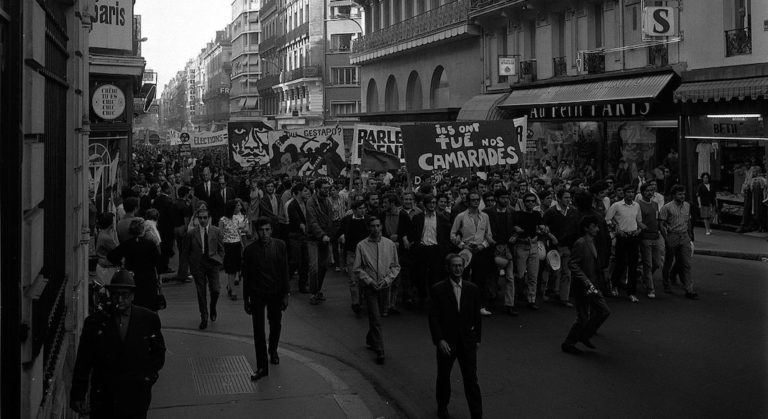Nuit Debout (“Up All Night”) began as demonstration against changes in France’s labor laws. It has since unleashed a seismic social shock, evoking memories of the spring that shook the world 48 years ago.
Crowds of mad-as-hell citizens, sometimes numbering in the thousands, are occupying public squares at night all over France. Office workers, academics, students, artists, parents with babies, retirees, illegal immigrants and homeless people hold “general meetings” at which everyone gets to speak.
They debate high unemployment, economic gloom and the failure of representative democracy to do anything about it. There is an intense feeling that people shouldn’t have to put up with offshore banks for the rich and austerity for everyone else, low wages for workers and astronomical pay for CEOs.
The nocturnal gatherings have taken hold in Paris, Marseille, Rouen, Rennes, Toulouse – almost 300 cities in France and abroad.
“We will soon be millions,” promises their Facebook page. Does this sound familiar?
David Graeber, a former leader of Occupy Wall Street, turned up after a few days of protest in Paris to show solidarity with the Nuit Debout “explosion.” He calls it “the most inspiring thing to happen since 2011.”
The word debout – “standing,” or “rise up!” – is the first word in the “Internationale,” a call to action, resistance, and insurrection. Nuit Debout began with a shared epiphany on the evening of Thursday, 31 March 2016. A group of activists in Paris’ Place de La République decided they would simply never go home, standing up 24/7 against globalization, political corruption and the onslaught of financial elites. It’s Citi Never Sleeps versus the nuitdeboutistes (“up-all-nighters”).
They have also reinvented the calendar. The month of March became a revolutionary continuum. When April 1st dawned, it was 32 March. Labor Day, May 1, morphed into 62 March 2016.
Ironically, the fuse was lit by the Socialist government of François Hollande, with a badly timed reformation of France’s labor code to make it easier for companies to hire and fire workers. Nuit Debout is channeling disgust with political parties beginning with the ruling Socialists.
Unlike OWS, however, support for Nuit Debout crosses party lines. Voters on the far left (over 90%) sympathize with Nuit Debout and so does the far right: 67% of people voting for far-right candidate Marine Le Pen say they support the movement. Overall, the French are split down the middle. Roughly half think Nuit Debout should be banned while the other half say they support it.
Overcoming self-segregation
From the beginning, Nuit Debout has borrowed from the experience of Occupy Wall Street. Its campaign is officially “horizontal” and self-empowerment is considered a form of “direct action.” The movement quickly deployed its own website, Twitter and Facebook to mobilize masses of people. There is also Debout Radio and Debout TV.
Anyone can speak for two minutes at the nightly general meetings if they wait their turn. People in the audience “vote” with arm signals. Hands in the air means “oui.” Crossed arms in the air means “non.” Arms crossed with clenched fists means, “I totally disagree.”
Paris’ Place de la République is the movement’s symbolic, physically packed and emotionally charged epicenter. Activists return each night to “occupy” the square where a plaque honors the 147 people who died at the hands of terrorists in France in 2015. There is a street-party atmosphere with poetry readings, concerts and food stalls.
On some nights, as many as 3000 people debate the future of the world. They debate, two minutes at a time, replacing the constitution, unemployment, tax evasion by companies like McDonald’s and Google, the government’s response to last year’s terrorist attacks (with surveillance laws and changes to the justice system), animal rights, climate change, etc, etc.
There are commissions, seemingly, on everything: neoliberal economics, universal minimum income, undocumented immigrants, French imperialism in Africa, the Panama Papers, ecology, prisons, hospitals, immigration, equal pay for women.
But night after night the general meeting has affirmed that there are no plans or precise demands and no leaders. No one speaks for the movement.
Roughly two-thirds of the protestors are university graduates from the middle class and already in their 30s. Many have been unemployed for extended periods of time or in low-paying jobs for which they are overqualified. Some are stuck in part-time or temporary work.
The movement is trying to reach out to the poor suburbs where most minorities live and unemployment is even higher. Like Occupy Wall Street before them, the “up-all-nighters” are seeking new ways to unite people.
“The challenge,” says François Ruffin, is “…to build a language that allows you to break out of self-segregation and to meet other social classes. ”
Ruffin is an inspiration to the officially leaderless up-all-nighters. His Michael Moore-style anti-capitalist film about the French plutocracy, Merci Patron (“Thank You Boss”) served as a catalyst for Nuit Debout.
Another guru of the movement is Frédéric Lordon, 54, an influential member of the Economistes Atterrés (“Appalled Economists”). He evokes the “major invisible social barriers that we need to break through in order to join educated urban youth together with the unionized working classes…the barriers separating each of them from the segregated youth in the suburbs are nothing less than fortifications.”
Existential threat of violence
The immediate, existential threat to the Nuit Debout’s survival is the violence taking place the margins of its nightly protests. Thugs infiltrating the ranks of peaceful protestors have burned cars, vandalized banks and shops, sprayed buildings with graffiti and hurled bottles at the police. There have been dozens of arrests.
Riot police have cordoned off Place de la République and imposed a 10pm limit on nightly protests.
”You always come back to the question of violence,” Graeber told an audience of Nuit Debout activists on April 12, “It’s better not to ask the question in moral terms but in terms of the organization. What level of violence is tolerable in a movement of direct democracy?”
In contrast to Occupy, Nuit Debout has not yet become a global media sensation. Astonishingly, it scarcely gets a mention in the mainstream Anglophone press. But the French media keeps the movement under a microscope that oscillates between left-wing and right-wing memes.
Like Occupy and Spain’s 15-M anti-austerity movement before it, Nuit Debout itself has no need of traditional news platforms. Its protesters communicate instantly with one another using social media.
They have no need of journalists either. Citizen reporter Rémy Buisine has been filming with his smartphone and broadcasting on Periscope. At one point, 130,000 people were following his tweets and Periscope live video stream.
I’m all for killing off my generation
Many of France’s most influential people – philosophers, editorialists, economists and politicians – are members of the ’68 generation. The French term for them is soixante-huitards (“sixty-eighters”).
After mythologizing their youthful rebellion for almost fifty years, the soixante-huitards now find themselves confronted, sometimes uncomfortably, with a new generation in revolt that has adopted their May 1968 revolutionary slogan: l’imagination au pouvoir – “power to imagination.”
Nuit Debout is “totally different” than May 1968 insists Danny “the Red” Cohn-Bendit, the French-German politician who was a student leader at the time. “Let’s stop comparing,” he said on Europe1. “Each generation has a right to its own form of revolt. What strikes me is the rejection of all ideology, any political system, all political parties.”
He considers up-all-nighters to be more polite.
“Nuitdeboutistes actually listen! You raise your hands if you agree and cross them if you don’t but you listen all the same without jeering… That’s new in France.”
Philosopher Alain Finkielkraut’s reception in Place de la République was less than polite. A member of the ’68 generation who has turned to the right, he was shouted down, called a “fascist” and told to “get the fuck out of here.” One protestor spat on him while others formed a shield to protect and escort him and his wife off the square.
The incident sparked a lot of heated soixante-huitard debate. Writing in the daily Le Figaro, Finkielkraut calls Nuit Debout “a revolutionary love-in bubble in the centre of a completely indifferent city…. Those who claim to be revitalizing democracy… are reinventing totalitarianism.”
“I’m all for killing off my generation,” commented Emmanuel Todd, in an interview with Fakir. “The ouster of Finkielkraut was fine by me. Up to that point, I was of the opinion that these young people were too nice.”
Paris and other French cities will probably try to evict Nuit Debout from city squares next month, before hosting the UEFA Euro 2016 soccer tournament, one of the largest sporting events in the world.
It’s hard to imagine that Nuit Debout will go quietly.
Like Occupy Wall Street, Nuit Debout is a radical attempt to reinvent participative democracy. Whatever the future brings, it will be hard to ignore the message that France’s political system is failing the people. And there’s more to come. In the same way Occupy inspired protests across the world, Nuit Debout is preparing for Global Debout.
The movement has issued a call for people around the world to occupy squares in a global protest on May 15.
Make that March 76.






